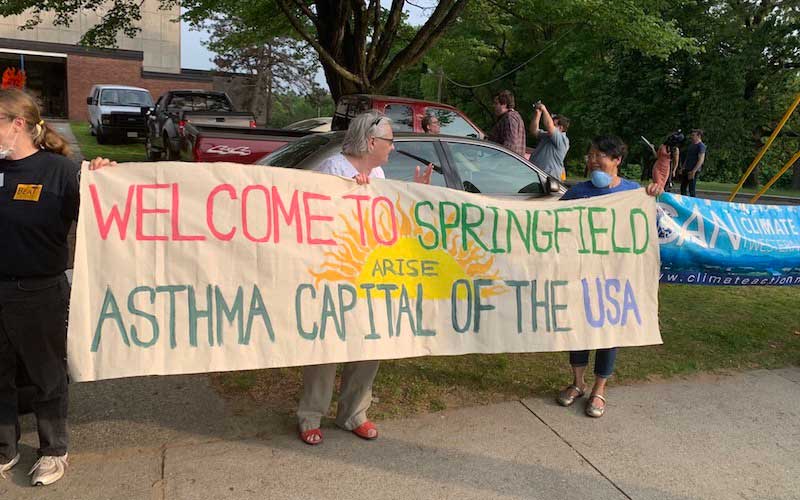
This biomass plant with expired permits refuses to die – but the Springfield won’t stop fighting for clean air. Photo: Rohemir Ramírez.
Springfield, Massachusetts, is a city that knows what it wants – and what it refuses to accept. Its residents want clean air, thriving neighborhoods, and a voice in shaping their neighborhoods. And for years, they’ve matched that vision with action. They’ve shown up – again and again.
From public hearings to protests, from zoning meetings to courtrooms, Springfield residents do the work. Not because it’s easy but because it’s home.
So, when Palmer Paving rebranded itself as Palmer Renewable Energy and proposed building a wood-burning biomass plant in 2011 across the street from homes, parks, and schools, Springfield residents saw through it. A 275-foot smokestack wasn’t progress, especially when it would just replace the company’s asphalt plant that already spewed grit and noxious odor across the neighborhood. In a city already battling some of the worst air quality in the nation, it was a threat.
From the start, the answer was loud and clear: no. No to more asthma. No to more pollution pumped into the air. No to the idea that this community – overwhelmingly Black, Brown, and working class – was expendable. That’s why today, the threat of reviving the biomass plant project – which the company falsely claims will provide “renewable” energy – angers residents who have worked for more than a decade to defeat it.
Victories Earned, Not Given
The community has opposed the biomass plant since 2008, but their fight took a big turn in 2011 when Palmer received two construction permits. Over the years, residents have fought harder than anyone should have to just to protect their neighborhood – and they’ve won major victories.
In 2013, the City Council strengthened its zoning laws, requiring a special permit for projects like this. In 2021, the Springfield Zoning Board of Appeals determined that Palmer’s permits had expired. It was a major victory – one the community celebrated. And, in 2023, the Massachusetts Land Court confirmed that victory: The permits had expired.
And yet, Palmer is still trying to resurrect it.
“Every time we think this zombie plant is dead, it comes back to life,” says Naia Tenerowicz, a Springfield resident and member of the Springfield Climate Justice Coalition.
The Anatomy of a Franken-permit
So, how did a project with long-expired permits stay on life support for over a decade?
The bones of this so-called Franken-permit were set in 2011 when Palmer obtained approval to prepare the site and pour the foundation for its smokestack. Per the building permits, the company had 180 days to start construction. They missed that deadline.
Typically, that would have been the end. But Palmer wasn’t ready to let go.
The first stitch knitting together a broken shell of a power plant proposal came from a 2010 state law aimed at helping housing and infrastructure projects that had stalled during the Great Recession. The original law extended certain permits granted between 2010 and 2012 for a two-year period. When the law was amended to cover permits issued as late as August 2012, Palmer retroactively claimed a four-year extension. The company wanted to use a law meant to protect housing development and provide relief to businesses as a voucher for reviving a polluting biomass project nobody wanted.
Palmer was determined to bring its weary carcass of an idea back to life. Over the years, they relied on lawsuits, hearings, and bureaucratic wrangling as excuses to stretch the permit’s lifespan. And in 2020, Palmer attached a head to its beast. During the Covid-19 pandemic, the state paused permit expirations to protect public health – allowing developers extra time for construction to prevent putting workers or nearby communities at risk. Palmer claims that the moratorium should have applied to them, too.
They’re leaning on a law meant to protect public health to push a project that would harm it.
– Suhasini Ghosh, CLF attorney
“This permit should have expired 14 years ago – that’s why it reeks,” says Ghosh. “But Palmer has leaned on legal technicalities to keep it frozen in time and prevent it from rotting.”
The Stakes Today
It’s now 2025, and the battle continues. In May, after another push by Palmer, the Massachusetts Appeals Court reopened the door for the company’s expired permits. But that decision didn’t approve construction – it simply reopened this legal fight.
CLF and Springfield’s City Council are now urging the state’s highest court to review the case. As we continue to work shoulder to shoulder with Springfield residents, we have a clear message: Outdated permits should not override today’s environmental protections or silence the voices of frontline communities. “This fight isn’t just about permits stamped in 2011,” says Alexandra St. Pierre, CLF director of communities and toxics.
It’s about setting a dangerous and senseless precedent: letting polluters pretend it’s still 2011 while ignoring today’s science and silencing community voices.
Alexandra St. Pierre, CLF director of communities and toxics
City Council President Michael A. Fenton puts it more bluntly: “The law says a building permit is good for six months,” he said. “But the developer claims theirs is still valid after nearly 14 years. That’s the definition of an absurd result. It’s time to let this bad idea go.”
The Springfield Community Remains Strong and United
Springfield isn’t fighting alone. More than 85 organizations across Massachusetts are backing the city. Recently, they’ve called on lawmakers to close loopholes that allow polluting biomass projects to receive taxpayer subsidies.
“Our families already pay the price with asthma, missed school days, and polluted air,” says Britteny Jenkins, environmental justice vice president at CLF. “We shouldn’t also be footing the bill so that polluters can profit at the expense of our health.”
CLF, along with our partners, sent a letter urging the legislature to pass two bills that would end subsidies for polluting biomass energy. Both are backed by Springfield legislators Senator Adam Gómez and Representative Orlando Ramos.
“Our communities deserve a healthy environment and clean air to breathe,” says Representative Ramos.
The stakes couldn’t be higher. If the state Supreme Court allows Palmer’s permit to stand, it could open the floodgates for other outdated, harmful projects – reviving zombie developments that sidestep current laws and public input.
Permit or Not, This Project Must Go
No judge has ruled that this facility is good for Springfield. No court has found it protects public health or serves the public interest. What’s being debated isn’t whether it’s right – just whether expired paperwork can still legally be brought back to life.
Palmer is clinging to permits from another era — when the law still failed to fully account for the long-term toll of air pollution on already overburdened communities.
“These permits rely on laws and assumptions that are over a decade old,” says CLF attorney Ghosh. “They don’t reflect what we know now – about public health, about equity, or about climate.”
And the fight is far from over. The latest ruling didn’t approve the facility – it simply reopened a legal door. Palmer still needs new permits, and the community is more prepared than ever to block them.
“This was a bad idea in 2011,” Ghosh adds. “It’s an even worse one in 2025.”
What Comes Next?
Springfield has already said no. Loudly. Repeatedly. And until that no is respected, the community will keep showing up. Not just to stop a polluting project but to demand a future where justice, health, and people come first.
It’s time to finally lay this zombie project to rest.



